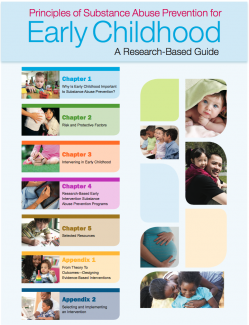Principles of Substance Abuse Prevention for Early Childhood

The National Institute on Drug Abuse’s (NIDA) Principles of Substance Abuse Prevention for Early Childhood (2017) is a special volume that supplements the organisation’s Preventing Drug Abuse Among Children and Adolescents, released in 2003.
It reflects “a growing body of research […] showing that providing a stable home environment, adequate nutrition, physical and cognitive stimulation, warm supportive parenting, and good classroom management in the early years of a child’s life (prenatal through age 8) can lead the child to develop strong self-regulation”.
The document goes on to assert that “positive effects of these interventions include delayed initiation and decreased use of drugs when the child reaches adolescence.”
Indeed, while substance use generally begins during adolescence, factors that are known to increase the risk are present as early as the prenatal stage. Therefore, the earlier an intervention takes place, the less likely it is that an individual will develop habits that are detrimental to their well-being, including drug addiction.
The guide is intended for parents, practitioners and policy-makers.
It includes seven evidence-based principles addressing the ways that early interventions may positively affect a child’s development.
Principles of Substance Abuse Prevention for Early Childhood also contains an overview of child development from the prenatal stage to age 8, as well as information about factors that place children at greater risk of developing substance use disorders later in life and ways to protect against these.
